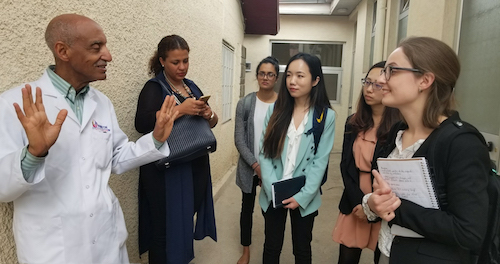
BA685 students working with Ethio-American Doctors Group (EADG) in Ethiopia interview a physician.
Qin Dong said the healthcare delivery course she took this semester taught her a lot about practices inside and outside the United States, including how healthcare organizations harnessed different business models to scale up and meet patient needs.But the biggest lesson for Dong from the weeks of classroom learning and in-country work came down to empathizing with the customer.
“My takeaway is probably true for every consulting-like project: don’t make assumptions about what is best for the customers, listen to them, and cater to their needs,” she said. “Any recommendations that don’t fit with a customer’s situation won’t be helpful at all regardless how successful it was in the past.”
Dong’s Rwanda team was one of five that spread out around the globe for the BA685: Healthcare Delivery in Emerging Markets course taught by WDI President Paul Clyde. Other teams worked in Ethiopia, India, Peru and Sri Lanka. All five teams will present recaps of their projects at 5 p.m. on April 16 in Room R1240 at the University of Michigan’s Ross School of Business. It is free and open to the public, and students in business, public health and other disciplines are encouraged to attend. A reception will follow.
Comprised mostly of MBA2 students, the course is designed to enhance participants’ international leadership capabilities, increase awareness of diverse business issues within the current global landscape, provide on-the-ground experience in a foreign country, and contribute to the success of partner health clinics and hospitals.
The course, organized and primarily funded by WDI with some financial support from Ross, responds to the increasing need for managers to have an international business perspective to augment their business and management knowledge. During the first part of the term, students learned about healthcare in emerging markets through lectures, guest speakers and case discussions. Students were then divided into five teams and prepared for visits to their selected country, traveling to those destinations in late February and early March.
The travel-study course empowers students to integrate what they learned in the classroom with hands-on experience. But unlike the Ross School Multidisciplinary Action Projects (MAP), Dong said the healthcare delivery course “exposes us to an environment where sponsors and other stakeholders have little business knowledge and no clear expectations about the projects.
“This can increase the difficulty and scope of the projects. However, it mimics real-life situations for the most part,” she said.
Clyde said the course is “business education at its best” – a collaborative learning environment with faculty and students learning from each other in an action-based learning setting.
“This course allows me to have detailed conversations with the students about some of the newer approaches to healthcare in low- and middle-income countries, and then gives them the chance to experience some of those markets in person and develop some of these new methods in concert with the institution,” Clyde said. “No matter how much I discuss it in class, there is no way to convey all of the challenges and opportunities in these markets without having the students actually visit the locations.”
Jennie Proto Gondhi, who was part of the Sri Lanka team, said she was attracted to the class to learn about the business perspective of healthcare and how business models can help solve public health problems. In pursuing a dual master’s in public health in epidemiology as well as health education/health behavior, Proto Gondhi said her classes dig deeply into evidence-based programs and validating data.
“However, I think sometimes a missing piece to public health problem solving is the idea that revenue, marketing and market value keeps programming going,” Proto Gondhi said.
She said the course showed her how valuable it is for people with public health and business skill sets to work in tandem to make a program successful.
“I enjoyed working and deliberating with teammates with varied expertise,” she said. “As we get ready to prepare our final reports and presentations, I walk away with the idea that public health programming can only be enhanced with further collaboration.”
Ross MBA student Kevin Jones, who worked with his team in Peru, called the course “probably the best interdisciplinary experience I’ve had at U-M.
“It integrates communities from the business, public health, policy and medical schools who have different but relevant perspectives on how to approach problems,” he said.
The Peru team worked with the Peruvian American Medical Society, a first-time partner for the course. The other institutions – Ethio-American Doctors Group (Ethiopia), LiveWell (India), Ruli District Hospital (Rwanda) and Grace Care Center (Sri Lanka) – have participated in the course multiple times, which allows Ross and WDI to build deep relationships and trust. Repeat partners also provides WDI with insights on what has and hasn’t worked with each institution, and that information is brought to bear in each project.
Here is a summary of each partner and project.
TEAM: Ethio-American Doctors Group (EADG)
LOCATION: Addis Ababa, Ethiopia
BACKGROUND: The Ethio-American Doctors Group is comprised of over 250 U.S. physicians of Ethiopian descent who have committed time and money to establish a state-of-the-art tertiary care hospital in Addis Ababa, Ethiopia.
PROJECT FOCUS: Develop a business model for a program to train nurses to international standards.
TEAM: Grace Care Center (GCC)
LOCATION: Trincomalee & Colombo, Sri Lanka
BACKGROUND: There is an extreme shortage of physicians in Sri Lanka and the number of people needing diabetes treatment is growing, making the shortage more acute. A GCC project looks into adding a new category of healthcare providers – diabetes technicians – to address the need.
PROJECT FOCUS: Assess the viability of a diabetic technician training program and undertake a market analysis to develop an understanding of the potential demand for such skills from existing physicians.
TEAM: LiveWell
LOCATION: Hyderabad, India
BACKGROUND: LiveWell Rehab Center in Madurai, India has been in operation since 2011. In October 2017, LiveWell began operations in Hyderabad.
PROJECT FOCUS: Examine the internal processes of the Hyderabad center compared to the Madurai facility to look for improvements.
TEAM: Peruvian American Medical Society (PAMS)
LOCATION: Chincha, Peru
BACKGROUND: PAMS Policlinico is a clinic offering multiple services, but is looking to become a center of excellence in ophthalmic surgery and gastroenterology.
PROJECT FOCUS: Conduct a market analysis to assess the profitability of a center of excellence in ophthalmic surgery and gastroenterology.
TEAM: Ruli District Hospital
LOCATION: Ruli, Rwanda
BACKGROUND: Ruli District Hospital, about two hours from Kigali, has worked with WDI for seven years and many of the projects are seeing fruit now.
PROJECT FOCUS: Study the revenue generating opportunities of a private clinic within the hospital.
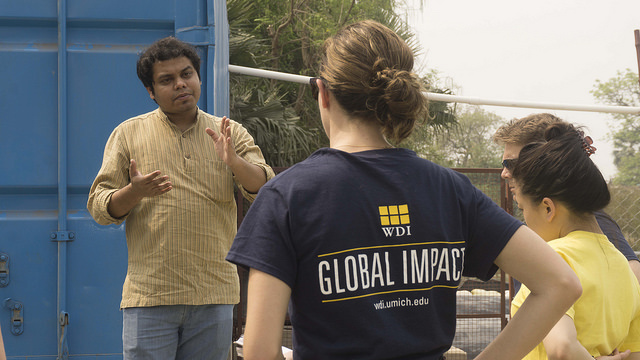
From a 2017 WDI-sponsored MAP team.
WDI’s partnership with Aravind Eye Care System dates back to 1999. Over the years, the organization has utilized a combination of student MBA teams and other engagements with the Institute to explore new ideas for growing strategically and improving operations at its hospitals and clinics, which offer world-class eye care at affordable prices.
Just a few of those completed projects include determining the appropriate governance structures for Aravind, consulting on expanding geographically and growing eye care services, implementing improved operational processes, delivering HR capabilities and leadership training for physicians, and improving the culture and patient experiences. Each of those projects were sponsored by WDI as part of the Ross School of Business’s annual Multidisciplinary Action Projects (MAP).
In 2016, a student team customized and tested an existing process model at select Aravind facilities that measured performance of each unit in terms that everyone in the organization could understand. Last year, the Aravind MAP team worked with senior leadership to develop a roadmap for the eyecare system’s future growth.
MAP is an action-based learning course offered at Ross in which MBA students receive guidance from faculty advisors. Each project requires analytical rigor, critical thinking, and teamwork. (Find out more about WDI’s MAP projects over the years here.)
After learning about their projects and conducting secondary research for several weeks, the students spend two to four weeks working with their organizations in the field.
In March, a MAP team (one of nine sponsored by WDI) will travel to Chennai, India to work at Aravind’s largest facility, which opened in September 2017 and offers the usual suite of services to patients, including specialty eye surgeries. As the new facility nears its six-month anniversary, administrators are studying patient care and looking for areas of improvement.
The students, as part of their overall work to enhance the patient experience, will work with Aravind leadership to develop recommendations on how to transition some of the work performed by eye specialists to general ophthalmologists, who are currently underutilized. Before heading to Chennai on March 17, the team will meet with faculty at the University of Michigan’s Kellogg Eye Center to hear how they manage similar issues.
Members of the MAP team said they are eager to observe the Aravind business model, which student Gerard Heath called “a leader around the world in developing solutions to provide high quality care in low-resource environments.” They all think the experience and work at Aravind will help them in the classroom as they finish up their studies, and may help inform their future career paths.
Kelsey Wyatt-Mair said she is interested in operations and “learning from this hands-on experience will equip me for later in my career, whether it’s in or out of healthcare.”
And Katie Zurales is “excited to see a different healthcare system” and how high quality, cost-effective healthcare “translates to different cultures.”
Of the four team members, which also includes Daniel Semaan, only Wyatt-Mair has some international work experience.
“It will be interesting for all of us – how to navigate that culture,” Wyatt-Mair said. “We’ll get exposed to the similarities and differences of Aravind with, say, Kellogg Eye Center.”
In between the work, the group plans to explore some local temples and beaches and perhaps travel to other cities. They said they were excited to discover Chennai was listed as one of the world’s best “food cities.”
WDI Initiatives often recruit partner organizations to work with MAP teams. The Aravind project is aligned with the Institute’s Healthcare Initiative. Similarly, WDI’s Education Initiative is working with the MAP team assigned to the Technological Institute of the Philippines (TIP) project. The students will create a strategic plan for a newer TIP initiative to improve the engineering and technology skills of students.
Amy Gillett, vice president of WDI’s Education Initiative, said MAP teams are one of the ways the initiative can improve the delivery of management education in emerging markets.
“The MAP teams bring new perspectives to universities in emerging markets,” she said. “They help university leadership think in different ways about how to expand into promising new areas or how to think strategically about growing an existing department or initiative. We’re so pleased to have this opportunity to unite MBA students – with their passion for social impact and their strategic thinking – with our university partners who welcome fresh insights.”
Like many of the Institute’s MAP partners, TIP has collaborated with WDI in the past. TIP was one of three university partners that worked with WDI on the STRIDE project.
“We’re so pleased to continue our successful partnership with TIP,” Gillett said. “During a recent trip to Manila, I had the opportunity to meet with TIP’s leadership. I was really impressed by their commitment to providing access to a college education for underserved communities as well as by their drive to continuously improve their operations and the services they offer to students.”
Here is a summary of each WDI-sponsored MAP project:
Aparajitha Foundations – India
Advisors: Paul Clyde, WDI and Ross School of Business; Stewart Thornhill, Zell Lurie Institute for Entrepreneurial Studies and Ross School of Business
MAP Team: Amirah Patterson, Riki Smolen, Robert Mack, Nathan Stevens
Aparajitha Foundations is a charitable trust that supports the less privileged, mainly in the areas of education and health.
The team will co-create alongside the founding team of the Michigan Academy for the Development of Entrepreneurs (MADE) as they test, validate, and iterate on MADE’s business model and product prototype for supporting entrepreneurs and Small Medium Enterprises (SMEs) in Madurai, India. MADE is a nonprofit institute established at the Ross School of Business by the Zell Lurie Institute for Entrepreneurial Studies, in partnership with WDI and Aparajitha Foundations, that works with entrepreneurship development organizations in developing countries to give individuals operating businesses in these environments the knowledge and best practices they need to thrive.
Aravind Eye Care System – India
Advisors: Paul Clyde, WDI and Ross School of Business; Jim Walsh, Ross School of Business
MAP Team: Gerard Heath, Katie Zurales, Daniel Semaan, Kelsey Wyatt-Mair
Aravind Eye Care System is a vast network of hospitals, clinics, community outreach efforts, factories, and research and training institutes in south India that has treated more than 32 million patients and has performed 4 million surgeries since its 1976 founding.
The MAP team will develop a framework for integrated patient care service delivery.
CURE International – Ethiopia
Advisors: Paul Clyde, WDI and Ross School of Business
MAP Team: Simon Kaufmann, Keegan McQuillan, Alan Wisniewski, Brandon Yelen
CURE operates clubfoot clinics in 17 countries around the world, each tasked with helping children and families deal with the congenital deformity that twists the foot, making it difficult or impossible to walk. In Ethiopia, CURE manages 37 clinics.
The MAP team will work to improve quality and increase scale of leg brace production in Ethiopia.
Ghana Emergency Medicine Collaborative – Ghana
Advisors: David Butz, WDI and Ross School of Business; Jim Walsh, Ross School of Business
MAP Team: Alexander Ukoh, Liam Kraft, Kartik Raju, Shreyance Mandaliya
The Ghana Emergency Medicine Collaborative aims to improve emergency medical care in Ghana through innovative and sustainable training programs for physician, nursing and medical students. The goal of the training programs is to increase the number of qualified emergency health care workers retained over time in areas where they are most needed.
The student team will investigate the feasibility of incorporating mobile payments into the emergency department workflow, including an analysis of how that will impact both the finances and operations of the department.
Imperial Logistics – South Africa
Advisors: David Butz, WDI and Ross School of Business; Ravi Anupindi, Ross School of Business
MAP Team: Justin Loescher, Jasmine Knowles, Courtney Alexander, Javier Castillo
Imperial Logistics provides logistics and supply-chain management across the African continent, and is a leading distributor of medicines and healthcare products.
The MAP team will establish an African Pharmaceutical Wholesaler Association (APWA).
Outbound Initiative – Brazil
Advisors: Paul Clyde, WDI and Ross School of Business; Stewart Thornhill, Zell Lurie Institute for Entrepreneurial Studies and Ross School of Business
MAP Team: Tsering Sherpa, Daniel Vergara Ramirez, Dale Jarosz, Varun Haralalka, Agustin Sosa, Mike Porcelli
Outbound Brasil uses the latest technology to identify global opportunities and resources for the growth of innovative and high impact business in that country, such as new and better markets, customers, partnerships, investments and awards.
The team will conduct a situation analysis on the Brazilian tech investment scenario and make recommendations for which innovations could make smart money more accessible to local startups.
REFRESCH – Gabon
Advisors: Paul Clyde, WDI and Ross School of Business; Bob Dittmar, Ross School of Business
MAP Team: Alena Golovchenko, Felipe Prieto Nunez, Sean Welsh, Allie Murphy
REFRESCH (Researching Fresh Solutions to the Energy/Water/Food Challenge in Resource Constrained Environments), is a consortium of educators and researchers working to improve the lives of those living in resource-constrained communities. Its goal is to find solutions to challenges in the areas of food, water and energy. It is funded by the University of Michigan Third Century Initiative and is headquartered at the University of Michigan Energy Institute.
The student team will identify a set of commercially viable business model archetypes or templates to increase access to renewable energy products and services in Gabon. They also will develop a recommendation on the most likely template to be profitable. A secondary goal is to understand the entrepreneurial skills and capabilities required to launch and operate such enterprises.
Technological Institute of the Philippines (TIP) – Philippines
Advisor: Paul Clyde, WDI and Ross School of Business
MAP Team: Joseph Grandominico, James Schoen, Alexa Thomas, Charlton Washington.
The Technological Institute of the Philippines (T.I.P.) is a leading private tertiary education institution that specializes in engineering and technology courses, and has an enrollment of 25,000 students on campuses in Manila and Quezon City. In 2016, the school launched T.I.P. TechnoCoRe, which aims to develop engineering and technology students’ skills in problem-business opportunity formulation, ideation, validation and execution – the core skills of technopreneurship.
The student team will create a strategic plan for T.I.P. TechnoCoRe.
Vayu Inc – Senegal
Advisor: Paul Clyde, WDI and Ross School of Business
MAP Team: Alexander Franczyk, Brandon Pickett, Adam Ronk, Adam Woodruff.
Vayu has developed an unmanned aerial vehicle (UAV) that can be used to deliver needed medical supplies and products to remote areas. The UAV launches and lands like a helicopter and flies like an airplane once off the ground. It can fly 100 kilometers and hold just over two kilograms of payload.
The team will conduct market analysis and develop an entry strategy for introducing delivery UAVs into Senegal’s market.
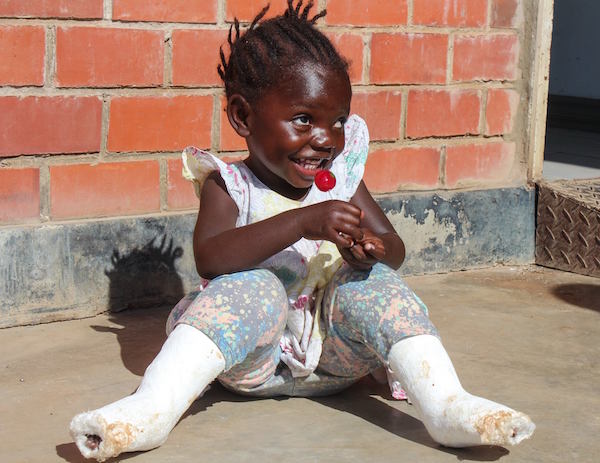
A child recovers from clubfoot treatment. Image courtesy of CURE International.
The head of WDI’s Healthcare Initiative recently spent a week in Ethiopia identifying and offering remedies for current challenges faced by the nonprofit charitable organization CURE International and its clubfoot program in that country.
CURE operates clubfoot clinics in 17 countries around the world, each tasked with helping children and families deal with the congenital deformity that twists the foot, making it difficult or impossible to walk. In Ethiopia, CURE manages 37 clinics.
Pascale Leroueil, director of the Healthcare Initiative, traveled to Ethiopia for the project, the first time the initiative has worked in the country. WDI has organized student MBA student teams from the University of Michigan’s Ross School of Business to work with CURE in the past, but in India.
“Cure officials in Ethiopia want to grow their coverage in the next two to five years to cover the entire country with clubfoot care, which is an ambitious goal,” Leroueil said. “So they were looking for some advice and our thoughts on their current challenges.”
Leroueil highlighted three areas of concern, beginning with how the nonprofit’s management reporting structure was organized and who reported to whom. Another focus was ensuring the physiotherapists and surgeons who perform clubfoot procedures are properly trained and remain up-to-date on the latest methods.
The final area highlighted by Leroueil that required attention was CURE’s ability to manufacture foot abduction braces at the scale and quality needed to treat the children with clubfoot.
To treat a child with clubfoot, ideally in the first three months of the child’s life, their affected foot is manipulated and placed in plaster casts for six to eight weeks. Often, the child’s Achilles tendon needs to be severed – an outpatient surgery done under local anesthesia. The foot is then placed in a cast again for about three weeks while the tendon grows back. After that, the feet should be in the correct position. The child will wear foot abduction braces for a few years to maintain the correct positioning of the feet.
Leroueil said a student team comprised of Ross School graduate students will soon tackle the challenge of identifying what is needed at the supply chain and brace manufacturing level for the nonprofit to scale up its coverage countrywide.
Leroueil said she gave CURE managers advice on how to address the other two issues she highlighted, and the nonprofit is deciding how best to resolve them. Leroueil said WDI is ready to assist CURE in the future.
“My hope is that our relationship with CURE will continue to grow, both in terms of student and staff projects,” she said.
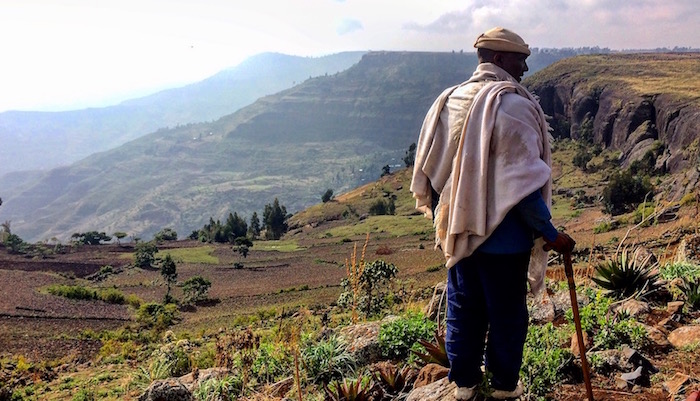
An Ethiopian farmer. (Images by Julia Entwistle).
Note: Julia Entwistle is a graduate student at the University of Michigan’s School for Environment and Sustainability, and this past summer was one of six WDI Global Impact interns placed with businesses and nonprofits around the world. Entwistle worked with the leadership at ADHENO, a non-profit focused on extreme poverty in Ethiopia. Her assignment involved conducting an impact evaluation of ADHENO’s environmental restoration and economic empowerment programs in the Northern Shewa province of Ethiopia. The organization sought the evaluation before rolling out its programs to additional rural sub-districts in Ethiopia. Entwistle worked with WDI’s Performance Measurement Initiative to develop a survey she implemented during her internship.
In the following article, originally published on NextBillion.net – an affiliated media site of WDI – Entwistle chronicles her specific work with ADHENO as well as explaining how profit-based solutions to environmental stewardship can be implemented.
By Julia Entwistle
Managing the economic interests of farmers and the environment is never an easy balance, regardless of where you are in the world. But perhaps nowhere is finding that equilibrium more difficult than Ethiopia. The UN Food and Agriculture Organization notes that about 12 million smallholder farming households account for an estimated 95 percent of agricultural production and 85 percent of all employment in the East African country, which has a total population of more than 100 million.
As a Global Impact intern at the William Davidson Institute (WDI), I spent the summer working with an Ethiopian nonprofit organization. ADHENO (which translates to Integrated Rural Development Association) implements environmental restoration and economic empowerment programs in the North Shewa region. . ADHENO’s work includes training for smallholder farmers on environmentally sustainable management practices such as terracing, use of improved seeds, water run off mitigation and intercropping. Much of ADHENO’s environmental restoration work is aimed at reducing the rate of erosion. Loss of soil matter and nutrients due to heavy rains and steep slopes in the region is a major concern for farmers. Another key program that ADHENO operates is called tree gudifecha. Gudifecha, meaning adoption in Amharic, is an afforestation program where farmers are paid to adopt and care for trees.
These Ethiopian farmers are not exempt from the underlying conflict that challenges most sustainability efforts, balancing the well-being of the environment with economic interests. The farmers are increasingly turning to chemical pesticides and herbicides to maintain crop yields on their increasingly degraded soils. This reliance on synthetic additives only digs these farmers into a bleaker situation as money is spent on the herbicides, which further degrade the soil. Additionally, these chemical additives have another unintended consequence that further jeopardizes the ecosystem as well as crop yields, killing the bees that are needed to pollinate the crops. In Ethiopia, use of herbicides as well as loss of habitat are causing a reduction in the local pollinator population, not unlike the global trend of pollinator decline that is threatening food security around the world. Fewer bees mean decreased crop productivity with yields cut by 12 percent to 36 percent for various crops, according to an FAO report in 2006.
Although ADHENO discourages the use of chemical herbicides, the organization has put forth an effort to restore the pollinator population by appealing to economic incentives. Indigenous species such as acacia and cordia trees are prime pollinator habitat, but provide little utility in terms of a return for a farmer. Alternatively, much of the rural populace can turn a profit from growing eucalyptus trees, which are harvested for use in construction. Although valuable, the eucalyptus tree is native to Australia and therefore does not support native pollinators. As part of ADHENO’s tree adoption program, farmers are paid a small amount of money to plant and care for trees. Of course, eucalyptus is the most desired tree for planting, but for every eucalyptus seedling that ADHENO provides, the farmers must also care for an indigenous tree to serve as bee forage. Through this strategy over 1 million trees have been adopted since the program’s inception in 2008.
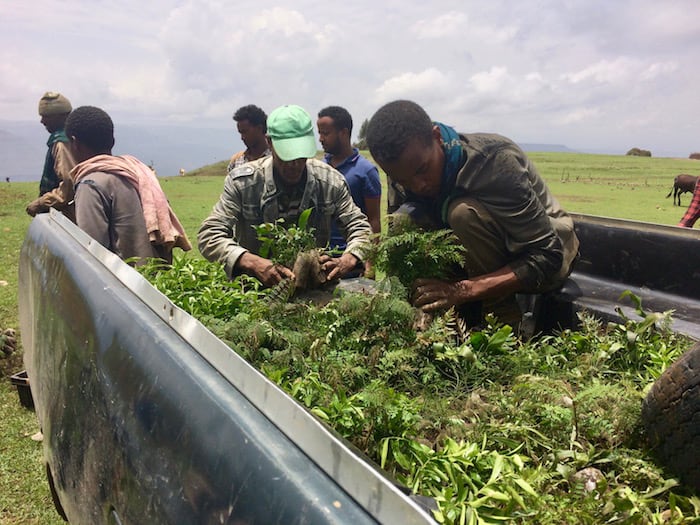
At an ADHENO tree nursery.
In addition to restoring pollinator habitat, ADHENO also encourages the adoption of bee hives as both a way to bolster the pollinator population and create an additional source of income for farmers. Through outside funding sources, ADHENO helped establish a honey cooperative. Initial funds supported the construction of a honey processing plant, covered registration fees and provided for training on how to safely harvest, process and package honey. Since the initial donation of startup funds, the co-op has been self-sustaining and functions like any other cooperative. The farmers sell their honey to the co-op, and the co-op sells the honey at a fixed price. The farmers then receive the profits from their honey sales, which are divided proportionally among the members based on how much honey they contributed. This organization provides a platform for the farmers to profit in a more organized and sustainable way.
The co-op also allows the farmers to package their product and access a wider market than they would otherwise be able to. A downside to this business strategy is that since the co-op sells honey at a fixed price, the profits received by the farmers are not responsive to fluctuations in the market price of honey. For this reason, the co-op forbids private sales for its members, in other words, to be a member of the co-op, farmers have to agree to sell all of their honey to the co-op, even if the market price is higher than the co-op’s fixed price. On the other hand this model guarantees some income for the farmers even if the market price for honey is below the fixed price.
It is also a goal of the co-op to encourage farmers to take up beekeeping. Senior co-op members conduct trainings with new and prospective members on keeping bees and harvesting honey. The co-op currently has more than 400 members.
My work with ADHENO is conducting an impact evaluation to determine what effect ADHENO’s programs, including beekeeping, farmer training and tree plantings, are having on the livelihoods of rural farmers. Along with other students from the University of Michigan’s School for Environment and Sustainability, we are evaluating both the ecological and economic impact of these programs. While our analysis of the data collected this summer is ongoing and we hope to have a final report of the results by the end of the year, we do know that ADHENO has certainly demonstrated innovative ways to advance the needs of farmers and the environment.
Meanwhile, ADHENO is planning to expand its programs to several additional rural communities in the North Shewa region and hope to use our evaluation to guide its growth for maximum impact.
The Ethio-American Doctors Group (EADG), a cohort of 250 physicians, is building a state-of-art hospital in Addis Ababa, Ethiopia. The hospital is expected to consist of 300 hospital beds, 8 operating rooms, and an 80-room multi-specialty clinic. A team developed a high-level business plan for EADG Cancer Center to be built in Addis Ababa. The report included a financial and operating model which identified initial start-up/investment costs, equipment and staffing needs, operating model and operating expense estimates, patient mix and revenue estimates. The team also provided summary of key findings, ancillary recommendations and touched upon potential governance issues and solutions.
The Ethio-American Doctors Group (EADG), a cohort of 250 physicians, is building a state-of-art hospital in Addis Ababa, Ethiopia. The hospital is expected to consist of 300 hospital beds, 8 operating rooms, and an 80-room multi-specialty clinic. A team was engaged to identify best practices for governance, and highlight aspects that would be most suitable for the overall EADG entity to operate with its current/future partners efficiently in Addis Ababa, Ethiopia. Specific research objectives included recommendations for EADG within the following areas: (1) Overview of authorities, rights and responsibilities; (2) Partner relations; (3) Cultural management; (4) Operations and evaluation; (5) Financial management
The co-founder of a start-up venture in South Africa that aims to save the honey bee will share how he designed the initiative to have economic, social and environmental impact as part of the WDI Global Impact Speaker Series. The talk begins at 5 p.m., Nov. 16 in room R2230 at the Ross School of Business, and is free and open to the public.
(Click here to watch Madison Ayer’s Nov. 16 classroom presentation.)
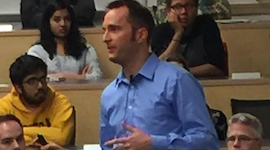
Madison Ayer, who has led several social ventures in Africa, including Honey Care Africa and Farm Shop, will discuss what he learned from those enterprises to launch Mbuyu Group, a large-scale honey bee conservation initiative. Mbuyu Group is working with South African National Parks to protect some of the world’s most critical honey bee ecosystems and strengthen the bee population. The group also hopes to become one of the largest global producers of organic honey.
Ayer has been featured in the WDI speaker series in the past. Last year, he talked about Honey Care Africa and Farm Shop, two ventures in Kenya that serve those living at the base of the pyramid.
Honey Care Africa provides smallholder farmers with beehives and harvest management services. In addition, it guarantees a market for the beekeeper’s honey at fair trade prices, helping to provide a steady, consistent source of income.
Farm Shop recruits and trains franchisees who then independently operate community-level, agro-dealer shops that supply smallholder farmers with seeds, fertilizers, tools, veterinary medicines and other items to improve crop yields.
In his 2015 talk, Ayer discussed the challenges that come with integrating low-income producers and consumers into the supply chain, including poor infrastructure, security concerns, informal regulations, and high costs. But if successful in overcoming these hurdles, Ayer said it can lead to long-term competitive advantage and positive economic impact on communities across the supply chain.
Watch Ayer’s 2015 presentation here and his interview with WDI Senior Research Fellow Ted London below:
In addition to his previous talks, Ayer also has engaged with WDI’s Scaling Impact Initiative and the Performance Measurement Initiative (PMI).
As part of a project funded by the German development agency GIZ, WDI studied the landscape of BoP facilitators in the sub-Saharan Africa region. The Scaling Impact initiative conducted field visits to Ethiopia and Kenya – including to Honey Care Africa and Farm Shop.
WDI’s Performance Measurement Initiative team also conducted a qualitative impact assessment in 2012 to identify Honey Care’s impact in alleviating poverty on children age eight years and younger, and developed a case study as part of the series entitled Focusing on the Next Generation: An Exploration of Enterprise Poverty Impacts on Children. The goal of the series, funded by the Bernard Van Leer Foundation, was to gain a greater understanding of the ways in which businesses in emerging markets impact young children’s lives and the potential to optimize impact on children.
Additionally, WDI Publishing also produced a popular teaching case study on Honey Care Africa that examined the business’s transition from obligating farmers to maintain their own hives to providing hive management services. The case also explored ways to enhance this new model, including strategies to reduce side selling. It was written by London and Heather Esper, senior program manager of PMI.
The Ethio-American Doctors Group (EADG), a cohort of 250 physicians, is building a state-of-art hospital in Addis Ababa, Ethiopia. The hospital is expected to consist of 300 hospital beds, 8 operating rooms, and an 80-room multi-specialty clinic.
The EADG wanted to assess major equipment needed for the proposed hospital, and determine costs associated with maintenance and repair of these items. A student team, from the University of Michigan’s Ross School International Business Immersion course (BA685), was engaged to provide an analysis and evaluation of total annual operating costs for imaging equipment, linear accelerator options, a lab services model, and human capital strategies. Data for analysis and evaluation were gathered from both primary and secondary research.
The student team identified human resource needs as a priority over equipment procurement so they proposed obtaining human capital to manage and maintain equipment. Additionally, the team made recommendations for a manufacturing partner for imaging equipment, a linear accelerator brand, and lab services operations.
The Ethiopian diaspora living in the United States have a strong motivation to engage with their homeland. However, they lack information on how to invest and what specifically to invest in. The Ethiopian diaspora are investing in the Ethiopian economy and, if properly engaged, may be willing to invest more and more productively. This Multidisciplinary Action Project (MAP) helped an Ethiopian bank identify the best ways to capitalize on the investment interests of Ethiopians living in the United States through various diaspora financial products. The project focused upon ways to increase diaspora investment with the goals of increasing access to capital for the SMEs. Through both primary and secondary research, the project involved extensive information gathering around the needs and desires of Ethiopian diaspora living in the U.S. and the state of Ethiopian economy with focus on the banking environment, credit market and state of SME funding. Based on market research, the student MAP team recommended two financial products and two implementation strategies for the bank to penetrate the diaspora marketplace.
Each summer, as part of its mission to provide high-quality learning opportunities to University of Michigan students, WDI sponsors interns who work overseas with international organizations.
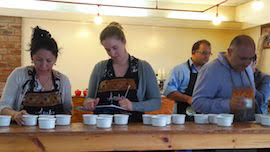
This year, five U-M graduate students representing five different schools across campus are working in the education, healthcare and poverty alleviation fields. The projects are based in Ghana, Rwanda, Ethiopia, India, Peru and the Philippines.
In addition to providing the students with meaningful business and cultural experience that comes with working internationally, the summer internships also provide WDI’s five initiatives with important insights from the field. This summer’s internships are managed in collaboration with WDI’s Performance Measurement Initiative (PMI), Education Initiative, and Healthcare Initiative.
“The PMI team is excited to provide measurement advice and support to WDI’s interns, learn from their related experiences, and apply those learnings to current and future projects,” said PMI Program Manager Heather Esper. “In particular, we are interested in learning more from the Pearson Affordable Learning Fund/ Affordable Private Education Centres internship in the Philippines. (Learn more about these projects below). Implementing and institutionalizing a new measurement system centered on learning, and conducting demand analyses and customer segmentation are both areas of great interest to our partners.”
Here are the interns and their projects.
Naomi Wilson, School of Education
Organization: Pearson Affordable Learning Fund (PALF) in partnership with Omega Schools
Country: Ghana
PALF makes minority equity investments in for-profit companies to meet the growing demand for affordable education across emerging market countries. Their vision is to help millions of children in the world access a quality education in a cost effective, profitable and scalable manner. Additionally, organization wants to demonstrate to governments and donors that private education can help to educate their youngest citizens in an efficient way.
Omega Schools is a chain of affordable schools in Ghana delivering quality education affordably to 15,000 low-income students.
As Omega continues its growth, it needs a structured, evidence-based, and easy-to-use software tool for selecting new school sites and determining what price point would be appropriate for specific locations. Wilson will research similar tools already in place, analyze enrollment and profitability of current schools, visit current and potential school site and identify key factors to be considered in site selection.
Michael Manansala, Ford School of Public Policy
Organization: PALF in partnership with Affordable Private Education Centres (APEC)
Country: The Philippines
APEC is a chain of affordable, high-quality secondary schools based in metro Manila focused on employability and life skills.
Manansala will aim to improve annual student assessment and quarterly academic reporting by analyzing existing student performance data and benchmarking it against publicly available data to determine learning outcomes. He also will review existing research and conduct a series of qualitative customer interviews and quantitative customer surveys to better understand why some parents send their children to APEC while others don’t.
Carissa De Young, Ross School of Business/School of Natural Resources and Environment
Organization: Shared-X
Country: Peru
Shared-X is a for-profit, startup social impact business in its first year of operation. It works to lift thousands of farmers out of extreme poverty by deploying advanced farming techniques on highly productive land to close the agricultural yield gap between developed and developing nations. Through the direct sale of specialty crops to international markets, Shared-X provides social, environmental, and economic benefits to local farming communities and generates strong returns for shareholders. Shared-X operates test farms that demonstrate best farming practices and secure contracts for its crops. It then expands access to its technology and markets to smallholder farmers in surrounding communities.
De Young will design a strategy to measure, communicate, and expand the social impact of Shared-X’s model of engagement with smallholder farmers. She will identify and measure impact by conducting interviews with stakeholders and experts ranging from current and potential future cooperative members, Shared-X personnel, and leaders in similar companies. She will then compare her findings with industry best practices to create a proposal for key performance indicators.
De Young also will identify a pathway to continue replicating the Shared-X model with additional smallholder farmers in other regions where Shared-X farms exist.
Elisabeth Michel, School of Public Health
Organization: The Ihangane Project (TIP)
Country: Rwanda
TIP empowers local communities to develop sustainable, effective, and patient-centered health care delivery systems that holistically respond to the needs of vulnerable populations. It envisions a world in which quality health care leads to healthy, inclusive, and empowered communities. TIP has been working with Ruli District Hospital in Rwanda and its seven associated health centers to determine key strategies for improving health outcomes within the community.
Michel will facilitate a successful hospital retreat that creates a shared vision of high-quality and patient-centered health care at Ruli, and includes an implementable framework for decision-making and problem solving. She also will help the hospital staff implement recommendations that come from the retreat.
Dilparinder Singh, Ross School of Business
Organization: PATH
Countries: India and Ethiopia
PATH is a Seattle-based international, nonprofit health organization that creates sustainable, culturally relevant solutions, enabling communities worldwide to break long-standing cycles of poor health. PATH is one of many global health organizations working with countries to reduce malaria deaths.
Singh will work with PATH to conduct a market landscape of current malaria testing and treatment algorithms in Ethiopia. He also will work with PATH’s India Innovation Hub, which encourages innovative approaches to healthcare.